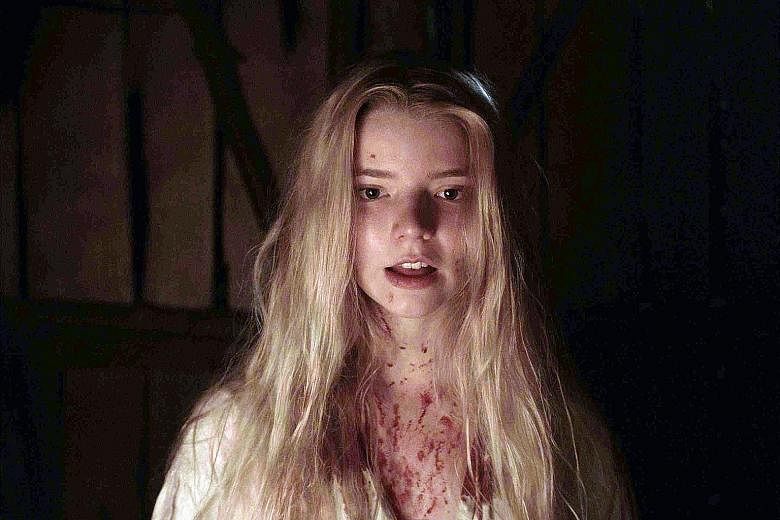Movies that break out of genre limits don't have to be artsy or opaque. Likewise, movies that tick off all the genre boxes don't have to be dull and conventional.
For an example of rule-breaking that pays handsome dividends, see The Witch (M18, 93 minutes, opens tomorrow, 4/5 stars), which is showing exclusively at The Projector.
It begins as a low-key costume drama about pilgrim settlers eking out a living from the soil of the New World. But at its midpoint, a switch happens - the mood of grey realism is ripped away by something more vivid and unsettling.
Patriarch William (Ralph Ineson) is cast out of his village for accusing elders of slacking in their Puritan faith. With wife Katherine (Kate Dickie) and four children in tow, he ploughs virgin soil on the frontier. But 17th-century America is a place of shadows for the immigrant family, who come to regret leaving the sunlit fields of England.
It's clear that writer-director Robert Eggers is a history buff in love with the minutiae of life in the new American colony and especially in the facts of the witchhunts that convulsed the community of the fervent Protestants.
Eggers, in his debut feature, which won the directing award at last year's Sundance festival, as well as a slew of other horror awards, makes something new out of the horror works which he is obviously a fan of.

The creepiness of William's young twins, for example, is from The Shining (1980) and the seductiveness of nature worship might be from Children Of The Corn (1984).
Film or stage portrayals of the Salem witch trials are meant to be understood as metaphors for modern forms of persecution. Eggers avoids this overtrodden path to take the literal route - his witches are very real, very ghastly creatures in league with the devil, and most of what we know about them from children's stories is true. This is a brave stylistic choice, one that could easily have caused the film to lapse into cheesiness if not for Eggers' firm grip on tone.
Everyone speaks in thee-thine- thou locutions. It immerses you in a Protestant community in which the weight of original sin sits like a stone on everyone's soul. Actors Ineson, Dickie and Anya Taylor-Joy (as eldest daughter Thomasin) exult in the archaic language, delivering powerful performances in this fairy tale of a family given a glimpse of the forces that lurk on the edge of the civilised world.

Swopping the darkness of North America for the colours of the South, we come to Pele: Birth Of A Legend(PG, 107 minutes, opens tomorrow, 3.5/5 stars). Even people who don't know anything about football know the titan of the sport who became a global sensation at the 1958 World Cup in Sweden.
This biopic of the Brazilian could not be more fomulaic if it tried, but it bursts with so much good- natured exuberance it is impossible to dislike it, in spite of its obvious emotional manipulation.
It starts with Edson (Leonardo Lima Carvalho), a poor village boy with innate talent who runs with a gang of plucky troublemakers. A tragedy straightens out our hero, who sees that football is not just a game, but also a way to atone for his sins and to heal the wounds of a nation robbed of World Cup victory, with a style of football that is derided by white Europeans because of Brazil's African heritage.
Along the way, there is a slobs-versus-snobs sidetrack, and, of course, a doubting coach (Law & Order's Vincent D'Onofrio, employing an awful Mexican accent). Coach Feola, too, learns life lessons from the teenage Pele (Kevin de Paula). The film wraps with Brazil's win at the 1958 World Cup.
Brothers Jeff and Michael Zimbalist make their fiction feature directorial debut with this biopic. Their past experience making documentaries in South America gives this work a sense of immediacy.
Everyone speaks English here, but the choice to give Brazilian actors most of the major roles makes up for that marketing-driven decision.
Football movies should contain a good amount of football, played and filmed well (you'd be surprised at how little or poorly the sport is depicted in biopics about players), and exciting football is the film's strongest suit.
Special Correspondents (NC16, 91 minutes, now showing on Netflix, 3/5 stars) is writer-director Ricky Gervais coming to grips with a favourite topic of his - the meaning of truth in a media-saturated world.
Suave radio journalist Frank (Eric Bana) and bumbling sound technician Ian (Gervais) have to cover a coup in Ecuador, but instead decide to stay in New York and fake a series of reports, including a final one in which they are kidnapped by rebels.
Like Gervais' other investigations into what looks real, what is real and whether it makes any difference (The Office, 2001-2003; The Invention Of Lying, 2009), this work is mildly satirical. The difference here is that the bite is so mild that this barely works as a satire.
Most attention is spent on the odd-couple farce provided by the squabbling characters of Gervais and Bana, whose lies spiral out of control as the radio audience demands more.
The insertion of a love interest Claire (Kelly Macdonald) and a skit featuring bumbling Ecuadorian rebels point to Gervais running out of ideas.
The film works best when we see just the two, trapped in their New York flat, tearing each other to bits.


